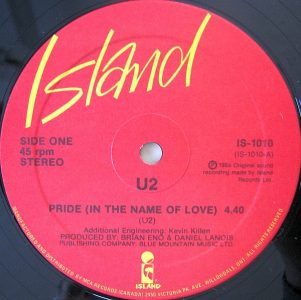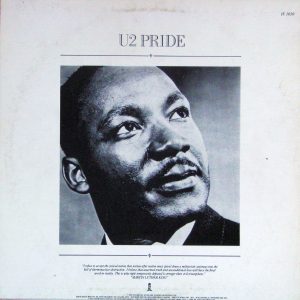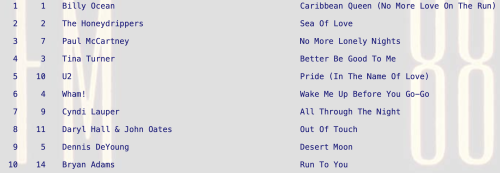#71: Pride (In The Name Of Love) by U2
City: Ottawa, ON
Radio Station: CFRA
Peak Month: December 1984
Peak Position in Ottawa ~ #5
Peak position in Vancouver ~ #20
Peak Position on Billboard Hot 100 ~ #33
Peak Position on New Zealand Singles chart ~ #1
Peak Position on Irish Singles chart ~ #2
Peak Position on UK Singles chart ~ #3
Peak Position on Australian Singles chart ~ #4
Peak Position on Dutch Singles chart ~ #5
Peak Position on Belgian Singles chart ~ #6
Peak Position on Norwegian Singles chart ~#7
Peak Position on Polish Singles chart ~ #9
YouTube: “Pride (In The Name Of Love)”
Lyrics: “Pride (In The Name Of Love)”
U2 is a band formed in Dublin, Ireland, in September 1976. Its members include lead vocalist and rhythm guitar player Bono, lead guitar and keyboard player the Edge, synthesizer and guitar player Adam Clayton, and drummer and percussionist Larry Mullen Jr. The band formed when its members were all teenagers. The band had several name changes before they settled on U2 in 1978.
Paul David Hewson was born in 1960 in Dublin, Ireland. He had a Protestant mother and a Roman Catholic father. In his teens he was part of a street gang and of the many nicknames he was given, the last were Bon Murray, Bono Vox of O’Connell Street, and finally just Bono. Bono Vox is an alteration of Bonavox, a Latin phrase which means “good voice.” After school, he was working at a garage on Airport Road in Dublin, and dreamt about being a rock star.
David Howell Evans was born in 1961 in Dublin. His family lived in England during his early childhood, and Evans grew to have both an English and an Irish accent. He was given a Spanish guitar by his mother at the age of seven, and by the age of nine he took to playing acoustic guitar. Early in the band’s career, Evans was given the nickname “The Edge” by members of the Lypton Village surrealist street gang that Bono also was a member of. Some biographers contend that this nickname was given because of the angular shape of Evans’ head. Yet, other writers have suggested that descriptions of his guitar playing, and his preference for not becoming fully involved and therefore remaining on the edge of things, are two other possibilities.
Adam Charles Clayton in 1960 in the Oxfordshire village of Chinnor in Southeast England. His father was a Royal Air Force pilot and the family lived in Nairobi, Kenya, early in his childhood. In 1965 his family met the Evans family and he got to be acquainted with David “The Edge” Evans. Clayton was sent to a private boarding school at the age of eight located in County Dublin. At the school students weren’t allowed to listen to popular music, so he became familiar with classical music. At the age of 13 he bought a £5 acoustic guitar from a junk-shop near the Dublin quays. Shortly afterward he joined a school band and began to play bass guitar.
Lawrence Joseph Mullen Jr. was born in 1960 in Dublin. He began to learn piano at a school of music at the age of eight. And when he was nine, Mullen began to play the drum. At his father’s suggestion, Mullen joined a marching band for young musicians called The Artane Band. However, the band required him to cut his hair. After three weeks in the marching band he dropped out after refusing to have his hair cut any shorter than he’d initially consented. In September 1976 Mullen posted a notice at the Mount Temple Comprehensive School where he was studying. The notice read “drummer seeks musicians to form band.” Those responding to the notice gathered with Mullen in his kitchen at his north Dublin suburb in Artane, on September 25, 1976. Present with Larry Mullen Jr. were Paul “Bono” Hewson, David “The Edge” Evans, Dik Evans – the Edge’s brother, Adam Clayton, and Mullen’s friends Ivan McCormick and Peter Martin.
Mullen recalls he’d suggested in the first ten minutes calling the band The Larry Mullen Band. But that suggestion was clearly a non-starter. McCormick and Martin left the gathering. The five who remained settled on the name Feedback. According to biographer Matt McGee, the band changed its name to The Hype, and finally to U2 when they entered a talent contest in Limerick, Ireland. The entry was as a four-piece-band, which they won. Dik Evans was cut from the lineup by 1978, leaving four bandmates.
In 1978, U2 performed in concert in Ireland with Thin Lizzy. And in 1979 and 1980 they opened several concerts for the Talking Heads and Orchestral Manoeuvres In The Dark, as well as Slade. And in 1980 they performed their first concert in Canada at the El Mocambo in Toronto. In 1980 U2 got a contract with Island Records and released their debut album Boy. In 1981, they released October, charted a Top Ten single in Ireland called “Fire”.
In 1983 U2 released its third studio album titled War. The album contained the #2 hit singles on the Irish pop charts “New Year’s Day” and “Two Hearts Beat As One”. Inspired by the Polish Solidarity Movement, “New Year’s Day” also climbed to #9 in the Netherlands and Norway, and to #10 on the UK singles chart. It also made the Top 20 in Belgium, France and Sweden.
A third single, “Sunday Bloody Sunday” concerned the January 30, 1972, incident in Derry, Ireland, where British troops shot and killed unarmed civil rights protesters. They shot 26 civilians during a protest march against internment without trial. Fourteen people died: 13 were killed outright, while the death of another man four months later was attributed to his injuries. Many of the victims were shot while fleeing from the soldiers, and some were shot while trying to help the wounded. The single climbed to #3 in the Netherlands and #11 in Belgium. However, the song did not chart as a single on either the Irish or UK singles charts. Nonetheless, the political edge to both “New Year’s Day” and “Sunday Bloody Sunday” earned U2 an expanded fan base and interest from music critics.
In October 1984 U2 released their fourth studio album, The Unforgettable Fire. It contained the lead single “Pride (In The Name Of Love)”.

The song was written by U2 bandmates. It is a tribute to Martin Luther King, Jr. An exhibit dedicated to the civil rights leader was on display at the Chicago Peace Museum in 1983 when the band visited. Bono is singing about those throughout history who have died because they preached of the merits of equality among all people, and practiced nonviolence as the only way to achieve their goal of having this equality universally recognized. The Rev. Dr. Martin Luther King Jr. is the primary example of nonviolent resistance as the only way to bring about changes in civil rights. But there are allusions to others in the song, including to Jesus Christ: “one man betrayed with a kiss.”
There is another line that reads “one man washed on an empty beach.” On April 6, 1930, Gandhi stepped on Dandi Beach and evaporated sea water to obtain salt crystals, encouraging anyone willing to risk prosecution to do the same. This was part of a peaceful protest and national boycott of British goods. A third line reads “one man caught on a barbed wire fence,” which could include persons in concentration camps in Nazi Germany, or in forced labour camps in the Gulag across Stalin’s Soviet Union (among others).
“Pride (In The Name Of Love)” is about singular people including Jesus of Nazareth Christ that lived their life with “pride.” Not in a boastful way, but with the pride a person has when their thoughts and actions are motivated by their understanding and full awareness of the dignity and sanctity of all human life. The song is a tribute or illustration or reminder to us, of martyrs to this ideal. It speaks to how they lived their life with an inner Pride in all of humanity and that this Pride is really an expression of God’s love for all of humanity. These people did what they did because they were trying to spread this message of God’s love for all of humanity.

“Pride (In The Name Of Love)” peaked at #1 Boston, New Haven (CT), Providence (RI), and Albany (NY), #2 in Indianapolis (IN), #3 in Los Angeles, Utica (NY), Chicago, and Fort Lauderdale, #4 in San Antonio (TX), Washington DC, Rockford (IL), Baltimore, and Fort Worth (TX), #5 in Ottawa, Rochester (NY), Scranton (PA), and Regina (SK), #6 in Sacramento (CA), and Nashville, #7 in Kansas City (MO), Hartford (CT), Seattle, Eugene (OR), and Tucson (AZ), #8 in Annapolis (MD), and Manchester (NH), #9 in Toledo (OH), Omaha (NE), Dayton (OH), Houston, and Philadelphia, #10 in Bethlehem (PA), Detroit, and Boulder (CO), #11 in Toronto, San Francisco, Dallas, and Flint (MI), #12 in Atlanta, and #15 in Montreal.
Internationally, “Pride (In The Name Of Love)” reached number-one in New Zealand, #2 in Ireland, #3 in the UK, #4 in Australia, #5 in the Netherlands, #6 in Belgium, #7 in Norway, #9 in Poland, and #12 in Sweden. However, the single stalled at #33 on the Billboard Hot 100.
Next, the title track, “The Unforgettable Fire” was released as a single in April 1985.
In 1987 U2 released their album The Joshua Tree. The cover featured a scene from the desert landscape taken from Joshua Tree National Park near Palm Springs (CA). The album topped the album charts in Canada, the United States, Austria, Netherlands, France, West Germany, New Zealand, Sweden and the UK. It won U2 two Grammy Awards, including for Album of the Year. The lead single, “With or Without You”, topped the singles charts in Canada, Ireland and the United States. It also climbed into the Top Ten in Australia, Belgium, Finland, France, West Germany, the Netherlands, New Zealand, Spain, Switzerland and the UK.
The followup single, “I Still Haven’t Found What I’m Looking For”, also topped the singles charts in Ireland and the Billboard Hot 100. It also made the Top Ten in Austria, Canada, Finland, the Netherlands, New Zealand and the UK. The song was nominated in the Grammy Award categories Song of the Year and Record of the Year. A third single from The Joshua Tree, “Where The Streets Have No Name”, topped the singles charts in Ireland and New Zealand. It also made the Top Ten in the UK, the Netherlands. The song won U2 a Grammy Award for Best Performance Music Video.
In 1988 U2 released Rattle and Hum. The lead single, “Desire”, topped the pop charts in Australia, Canada, Ireland, Israel, Italy, New Zealand, Spain and the UK. It won a Grammy Award for Best Rock Performance by a Duo or Group with Vocal. A follow up single, “Angel Of Harlem”, topping the charts in New Zealand, and making the Top Ten in Ireland, the Netherlands and the UK. It received a Grammy Award nominated for Best Song Written for Visual Media.
A third single from the Rattle and Hum album featured B.B. King called “When Love Comes To Town”. It also topped the pop chart in Ireland, and did very well in New Zealand, the Netherlands and the UK. Both the single and Rattle and Hum received Grammy Award nominations for Best Rock Performance by a Duo or Group with Vocal. And a fourth track, “All I Want Is You” also topped the pop chart in Ireland, and climbed into the Top Ten in Australia, Finland, New Zealand and the UK.
Then in late 1991 U2 released Achtung Baby. In English this meant “Watch Out (or Look Out) Baby.” It was nominated for Album of the Year, and won U2 a Grammy Award for Best Rock Performance by a Duo or Group with Vocal. The lead single from the album, “The Fly”, was a number-one hit in Australia, Ireland, Italy, New Zealand, Norway, Portugal, Spain and the UK. It also climbed into the Top Ten in in other international markets. But in North America the single stalled at #61 on the Billboard Hot 100. However, the second track from the album, “Mysterious Ways”, climbed to number-one in Ireland and Portugal, and the Top Ten in nine other international markets including the United States. A third single, “One” peaked at #1 in Ireland, and climbed into the Top Ten in six other countries.
The third song in their set list was “Even Better Than The Real Thing“. A final single from Achtung Baby was “Who’s Gonna Ride Your Wild Horses”.
In 1993 U2 released their eighth studio album Zooropa. The album a Grammy Award for Best Alternative Music Performance, and for Best Music Video Long Form. The single “Stay (Faraway, So Close!)”, from the film Faraway, So Close!, climbed into the Top Ten in nine international markets in Australia and Europe.
In 1995 U2 contributed the single “Hold Me, Thrill Me, Kiss Me, Kill Me” to the film soundtrack Batman Forever. The song was nominated for a Grammy Award in the categories for Best Rock Performance by a Duo or Group with Vocal, and for Best Rock Song. It also received a Golden Globe Award nomination for Best Original Song. Later in 1995, U2 released the single “Miss Sarajevo”, the theme song for the documentary film of the same title. Opera singer Luciano Pavarotti made a guest vocal appearance singing an operatic part in the song.
In March 1997, U2 released the album Pop. It topped the album charts in over twenty international markets. The lead single, “Discothèque”, climbed into the Top Ten record charts in over twenty countries, peaking at #1 in seven. The album’s second single, “Staring at the Sun”, peaked at number-one in Canada, Iceland, and climbed into the Top Ten in seven other nations. Both “Last Night On Earth” and “Please” also did well internationally as additional singles from the album.
In the winter of 1998-99 U2 released The Best of 1980–1990. They re-recorded a B-side from that era titled “Sweetest Thing”. The single climbed to #1 in Canada, Iceland, Ireland and Poland. In 2001 U2 released their tenth studio album, All That You Can’t Leave Behind. It won a Grammy Award in 2002 for Best Rock Album. Its singles included “Beautiful Day”, “Stuck In A Moment You Can’t Get Out Of”, “Elevation” and “Walk On”.
In 2001 U2’s “Beautiful Day” won three Grammy Awards for Record of the Year, Song of the Year, and Best Rock Performance by a Duo or Group with Vocal. The bands’ 2002 single “Elevation” also won a Grammy for Best Rock Performance by a Duo or Group with Vocal. This despite the single not cracking the Billboard Hot 100, though it topped the pop charts in Canada, Ireland, the Netherlands and Poland. A similar feat was achieved with “Walk On” in 2003, winning a Grammy Award for Record of the Year, and receiving two other nominations. That year “The Hands That Built America”, from the film Gangs of New York, won a Golden Globe Award, and received an Academy Award.
Since 2004, U2 has received Grammy Award nominations for Best Rock Album for How to Dismantle an Atomic Bomb (won in 2005), No Line on the Horizon (2010), and Songs of Innocence (2015). It also won Grammy Awards for its singles “Vertigo”, “Sometimes You Can’t Make It on Your Own” and “City of Blinding Lights”. Over the years U2 has won 22 Grammy Awards, and been nominated for an additional 24 awards.
September 1, 2025
Ray McGinnis
References:
Matt McGee, U2: A Diary, (Omnibus Press, 2008).
Mick Wall, Bono: In The Name Of Love, (Thunder’s Mouth Press, 2005).
Cormac McSherry, “Bono’s Teenage Kicks,” Guardian, June 17, 2007.
Steve Stockman, Walk On: The Spiritual Journey Of U2, (Relevant Books, 2008).
Neil McCormick, U2 by U2, (It Books, 2009).
Robert Vagacs, Religious Nuts, Political Fanatics: U2 in Theological Perspective, (Cascade Books, 2005).
Niall Stokes, U2: The Stories Behind Every U2 Song, (Sterling Publishing, 2010).
“Tours,” U2.com.

CFRA 580-AM Ottawa Top Ten | December 21, 1984

Leave a Reply